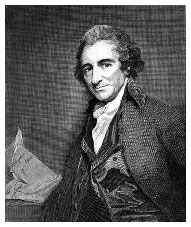 For some reason I can’t get Dick Gaughan out of my head today.
For some reason I can’t get Dick Gaughan out of my head today.
More specifically, I can’t get Gaughan’s version of the Graham Moore song “Tom Paine’s Bones” out my head. Gaughan’s version is so much more passionate, or maybe angry, than Moore’s, that it sticks in my head as the definitive one–of course, it might just be that Gaughan being Scottish sounds angrier.
I suspect that the only way I will be able to put this song to rest is to write a mostrously long post about Tom Paine, and how his works (or at least parts of them) have as much applicability today, if not more, as they did when they were first authored.
Until I get around to that, here are a couple of snippets:
- Independence is my happiness, and I view things as they are, without regard to place or person; my country is the world, and my religion is to do good.
The Rights of Man (1791) - Some writers have so confounded society with government, as to leave little or no distinction between them; whereas they are not only different, but have different origins. Society is produced by our wants, and government by our wickedness; the former promotes our POSITIVELY by uniting our affections, the latter NEGATIVELY by restraining our vices. The one encourages intercourse, the other creates distinctions. The first a patron, the last a punisher.
Common Sense (1776) - An avidity to punish is always dangerous to liberty. It leads men to stretch, to misinterpret, and to misapply even the best of laws. He that would make his own liberty secure must guard even his enemy from oppression; for if he violates this duty he establishes a precedent that will reach to himself.
Dissertation on First Principles of Government (Paris, July 1795) - All national institutions of churches, whether Jewish, Christian, or Turkish, appear to me no other than human inventions set up to terrify and enslave mankind, and monopolize power and profit.
The Age of Reason, I (1793) - Of all the systems of religion that ever were invented, there is none more derogatory to the Almighty, more unedifying to man, more repugnant to reason, and more contradictory in itself, than this thing called Christianity. Too absurd for belief, too impossible to convince, and too inconsistent for practice, it renders the heart torpid, or produces only atheists and fanatics.
The Age of Reason, II (1795)
Potentially interesting factoids:
- I first read Paine’s works after reading Bertrand Russell’s praise of Paine in the essay “The Fate Of Thomas Paine“.
- I first heard mention of Dick Gaughan in a pub in Dublin on my honeymoon. The musician had played a song I liked, and I asked who had written it–and then I got soundly lectured for not recognizing the name. I am reasonably sure that the song was “Tom Paine’s Bones“, but memory is suspect, and given the timing it might well actually have been “Thomas Muir of Huntershill“
Also not a song written by Gaughan. Also a character worthy of his own post sometime. . - No one knows where Tom Paine’s bones are. He died in America, and it is rumoured that his remains were brought back to England but their whereabouts are now completely unknown. Or at least if anyone knows, they aren’t talking.



1 comment for “This is the Age of Reason, these are the Rights of Man”